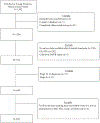Impact of fertility concerns on endocrine therapy decisions in young breast cancer survivors
- PMID: 33886123
- PMCID: PMC8351455
- DOI: 10.1002/cncr.33596
Impact of fertility concerns on endocrine therapy decisions in young breast cancer survivors
Abstract
Background: The diagnosis and treatment of breast cancer can have profound effects on a young woman's family planning and fertility, particularly among women with hormone receptor-positive breast cancer.
Methods: The Young Women's Breast Cancer Study was a multicenter cohort of women aged 40 years or younger and newly diagnosed with breast cancer from 2006 to 2016. Surveys included assessments of fertility concerns, endocrine therapy (ET) preferences, and use. Characteristics were compared between women who reported that fertility concerns affected ET decisions and those who did not. Logistic regression was used to identify factors associated with having an ET decision affected by fertility concerns.
Results: Of 643 eligible women with hormone receptor-positive, stage I to III breast cancer, one-third (213 of 643) indicated that fertility concerns affected ET decisions. In a multivariable analysis, only parity at diagnosis was significantly associated with fertility concerns affecting ET decisions (odds ratio for nulliparous vs ≥2 children, 6.96; 95% confidence interval, 4.09-11.83; odds ratio for 1 vs ≥2 children, 5.30; 95% confidence interval, 3.03-9.87). Noninitiation/nonpersistence was higher among women with fertility concerns versus those without fertility concerns (40% vs 20%; P < .0001). Among women with fertility-related ET concerns, 7% (15 of 213) did not initiate ET, and 33% (70 of 213) were nonpersistent over 5 years of follow-up. Of these women, 66% (56 of 85) reported 1 or more pregnancies or pregnancy attempts; 27% (15 of 56) had resumed ET at the last available follow-up through 5 years.
Conclusions: Concern about fertility is a contributor to adjuvant ET decisions among a substantial proportion of young breast cancer survivors. Ensuring family planning is addressed in the setting of ET recommendations should be a priority throughout the cancer care continuum.
Keywords: adherence; breast cancer; endocrine therapy; fertility concerns; pregnancy.
© 2021 American Cancer Society.
Conflict of interest statement
Conflicts of Interest:
Tal Sella – Honorarium: Roche
Jeffrey Peppercorn - GlaxosmithKline: Employee and Stock (spouse), Pfizer: Research funding (self, to my institution), Athenex: consulting (self), Abbott Laboratories: consulting (self)
Phil Poorvu - Medscape: Peer review of educational materials
Figures
Comment in
-
We have to talk about it: Bringing fertility into the conversation for young women with breast cancer.Cancer. 2021 Aug 15;127(16):2873-2876. doi: 10.1002/cncr.33595. Epub 2021 Apr 22. Cancer. 2021. PMID: 33886118 No abstract available.
References
-
- Early Breast Cancer Trialists’ Collaborative Group (EBCTCG), Davies C, Godwin J, Gray R, Clarke M, Cutter D, et al. Relevance of breast cancer hormone receptors and other factors to the efficacy of adjuvant tamoxifen: patient-level meta-analysis of randomised trials. Lancet. 2011. 27;378(9793):771–84. - PMC - PubMed
-
- Gradishar WJ, Anderson BO, Abraham J, Aft, Rebecca, Agnese, Doreen. NCCN Clinical Practice Guidelines in Oncology: Breast Cancer. Breast Cancer. 2020;(2.2020):215.
-
- Wassermann J, Gelber SI, Rosenberg SM, Ruddy KJ, Tamimi RM, Schapira L, et al. Nonadherent behaviors among young women on adjuvant endocrine therapy for breast cancer. Cancer. 2019. 15;125(18):3266–74. - PubMed
Publication types
MeSH terms
Grants and funding
LinkOut - more resources
Full Text Sources
Other Literature Sources
Medical


